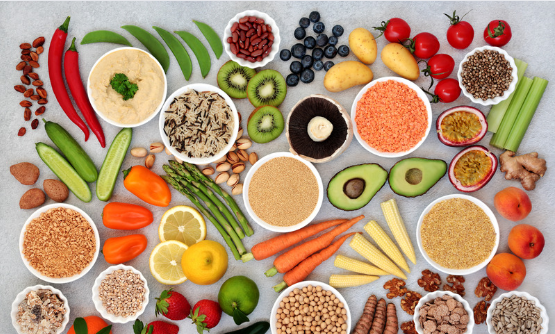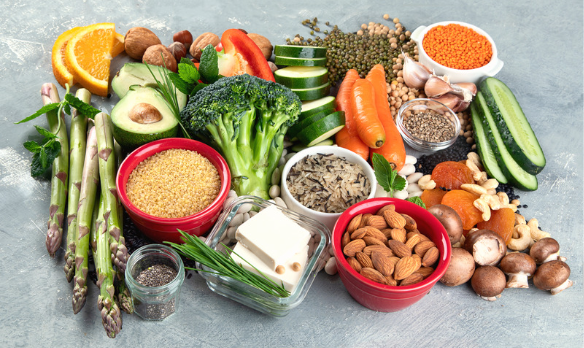Healthy vegetarian eating is a balanced approach to consuming plant-based foods. It emphasizes nutrients from fruits, vegetables, legumes, and whole grains.
Embracing a vegetarian lifestyle can lead to numerous health benefits, including a reduced risk of chronic diseases and improved weight management. It’s essential to plan meals that are rich in protein, iron, calcium, and vitamins to ensure a well-rounded diet.

Transitioning to a vegetarian diet doesn’t have to be challenging; with a variety of recipes and food options available, it can be an enjoyable and fulfilling way to eat. Crafting a vegetarian meal plan that suits individual needs and preferences is key to maintaining this healthy eating pattern. By focusing on whole, unprocessed foods, vegetarians can thrive on a diet that’s as nutritious as it is ethical and environmentally sustainable.
Embracing A Vegetarian Lifestyle
Deciding to live a vegetarian lifestyle is a step towards better health and a kinder world. Vegetables, fruits, grains, and legumes become the stars of your meals. It’s not just about removing meat; it’s about discovering a rainbow of foods that maybe you’ve never tried before. Let’s explore the vibrant world of vegetarianism and see how easy it is to make the switch.
Reasons To Choose Healthy Vegetarian Eating
People embrace vegetarianism for various reasons. Some want to improve their health. Others wish to protect animals or the environment.
- Health benefits are immense, including lower risks of heart disease, hypertension, and type 2 diabetes.
- Environmental impact is reduced as plant-based diets need less water and land, and they produce fewer greenhouse gases.
- Animal welfare concerns drive many to vegetarianism to avoid supporting inhumane practices in the meat industry.
Transitioning To A Plant-based Diet
Changing your diet can feel daunting, but it doesn’t have to be. Start with small, manageable steps and gradually increase the number of plant-based meals you eat each week.
- Begin by including more fruits and vegetables in your diet.
- Explore meat substitutes like tofu, tempeh, and seitan.
- Get creative with beans, nuts, and seeds for protein.
- Try new recipes that feature whole grains as the main ingredient.
- Educate yourself about nutrient-rich foods to ensure a balanced diet.
Remember, the key is to enjoy the journey as you discover the flavors and benefits of a vegetarian lifestyle.
Essential Nutrients For Vegetarians
When embracing a vegetarian lifestyle, understanding which nutrients are essential is key. A well-planned vegetarian diet can be nutritious and delicious. Let’s dive into the vital nutrients that keep vegetarians thriving.
Protein Sources Without Meat
Protein is crucial for muscle repair and immune function. Vegetarians can easily meet their protein needs with a variety of plant-based options.
- Lentils and beans: Great in salads or soups.
- Tofu and tempeh: Perfect for stir-fries and grilling.
- Quinoa and amaranth: Complete proteins good for sides or mains.
- Nuts and seeds: Snack on them or sprinkle over dishes.
Iron And Vitamin B12 On A Vegetarian Diet
Iron supports blood health, and vitamin B12 is key for nerve function. Both are found in meat, but vegetarians can find them elsewhere.
| Nutrient | Vegetarian Sources |
|---|---|
| Iron | Leafy greens, fortified cereals, legumes |
| Vitamin B12 | Fortified foods, nutritional yeast, plant milks |
Pair iron-rich foods with vitamin C for better absorption. Think spinach salad with orange slices.
Balanced Vegetarian Meal Planning
Embarking on a vegetarian lifestyle means more than just cutting out meat. A well-thought-out vegetarian meal plan ensures you get the necessary nutrients. This guide will help you create balanced meals every day.
Creating A Diverse Plate
A colorful plate is your ticket to a nutrient-rich vegetarian meal. Aim to include a variety of foods:
- Vegetables: Spinach, broccoli, and bell peppers add vitamins and minerals.
- Fruits: Berries, oranges, and apples provide antioxidants and fiber.
- Grains: Quinoa, brown rice, and whole wheat offer complex carbs and protein.
- Proteins: Beans, lentils, and tofu are great for energy and muscle repair.
- Fats: Avocado, nuts, and seeds give you healthy fats.
Use healthy cooking methods like steaming, grilling, or baking to keep your meals nutritious.
Weekly Meal Prep Strategies
Preparing your meals in advance saves time and keeps you on track. Here are some tips:
- Plan your meals: Decide on what you will eat throughout the week.
- Shop with a list: Stick to your grocery list to avoid impulse buys.
- Batch cook: Make large portions of dishes that store well.
- Prep ingredients: Wash and cut veggies to save time during the week.
- Use containers: Store meals in clear containers for easy access.
Label your containers with dates to keep track of freshness. Rotate your menu to prevent boredom and ensure variety.
Vegetarian Recipes For Beginners
Embarking on a vegetarian lifestyle is an exciting journey. With the right recipes, beginners can enjoy delicious and wholesome meals. Let’s dive into easy-to-make vegetarian dishes that pack a nutritious punch!
Easy And Nutritious Starters
Starting your meal with a light yet flavorful dish sets the tone for a delightful dining experience. These starter recipes are not only simple to prepare but also loaded with essential nutrients.
- Avocado and Tomato Salad: Cube ripe avocados and toss with cherry tomatoes, olive oil, and lemon juice.
- Carrot Soup: Blend boiled carrots with ginger, garlic, and vegetable broth for a creamy soup.
- Cucumber Rolls: Fill thinly sliced cucumbers with hummus and bell peppers, then roll them up for a crunchy bite.
Quick Vegetarian Main Courses
Main courses should be hearty and satisfying. These quick vegetarian options are perfect for those on the go, ensuring a delicious meal in no time.
| Dish Name | Key Ingredients | Preparation Time |
|---|---|---|
| Stir-Fried Tofu and Veggies | Tofu, bell peppers, broccoli, soy sauce | 20 minutes |
| Spaghetti Aglio e Olio | Spaghetti, garlic, olive oil, chili flakes | 15 minutes |
| Chickpea Curry | Chickpeas, tomatoes, coconut milk, spices | 25 minutes |
Overcoming Common Vegetarian Diet Challenges
Many vegetarians face hurdles daily. But with the right tips, these can be easy to handle. Let’s dive into common problems and smart solutions.
Dealing With Social Situations
Being vegetarian at social events can be tricky. Plan ahead and communicate your dietary needs early. Offer to bring a vegetarian dish. This ensures you have something to eat and introduces others to vegetarian cuisine. When dining out, pick the venue if possible. Look for places with good vegetarian options.
- Communicate: Let hosts know you’re vegetarian.
- Contribute: Bring a vegetarian dish to share.
- Choose: Suggest restaurants with varied menus.
Finding Vegetarian Options While Traveling
Traveling as a vegetarian doesn’t have to be hard. Use apps to find veg-friendly spots. Research your destination before you go. Many places now cater to vegetarians. Look for local markets. They often have fresh, vegetarian foods. Stay places with kitchens to cook your meals.
| Tips | Benefits |
|---|---|
| Use Apps | Discover new places easily. |
| Research | Know your options beforehand. |
| Local Markets | Access fresh produce. |
| Stay with a Kitchen | Control what you eat. |
Supplements And Superfoods For Vegetarians
Embracing a vegetarian lifestyle invites questions about nutrition. Concerns often revolve around getting enough protein, vitamins, and minerals. This is where superfoods and supplements step in. They fill nutritional gaps and boost overall health. Let’s dive into the essentials every vegetarian should know.
When To Consider Supplements
Supplements become crucial when dietary choices fall short. Certain nutrients are less available in plant-based foods. Key examples include Vitamin B12, Iron, Calcium, and Omega-3 fatty acids. Vegetarians should consider supplements in these cases:
- Vitamin B12: Found primarily in animal products.
- Iron: Plant-based iron is less absorbable.
- Calcium: Crucial for bone health, harder to find in greens.
- Omega-3: Essential fats mostly in fish.
Regular blood tests can help determine the need for supplements. Always consult a healthcare professional before starting any supplement regimen.
Superfoods To Enhance Your Diet
Superfoods are nutrition powerhouses. They provide vitamins, minerals, antioxidants, and more. Here’s a list of superfoods vegetarians should include:
| Superfood | Benefits |
|---|---|
| Chia Seeds | Rich in Omega-3, fiber, and protein. |
| Quinoa | Complete protein with all nine amino acids. |
| Spinach | High in iron, calcium, and vitamins. |
| Berries | Packed with antioxidants. |
| Nuts and Seeds | Good sources of healthy fats and protein. |
Incorporating these superfoods can enhance a vegetarian diet significantly. They add flavor, variety, and a nutritional punch to meals.
The Impact Of Vegetarianism On Health
Choosing a vegetarian lifestyle can bring significant changes to your health. This plant-based journey is not just about cutting out meat; it’s about embracing a variety of foods that enhance well-being. Let’s dive into how a vegetarian diet impacts health, uncovering both the long-term benefits and potential risks.
Long-term Health Benefits
Vegetarian diets are rich in essential nutrients, often leading to numerous health advantages. Below are key benefits that a vegetarian lifestyle can offer:
- Heart health: Plant-based meals are low in saturated fat, reducing heart disease risk.
- Weight management: High fiber content in vegetables aids in feeling full, helping with weight control.
- Diabetes prevention: A balanced vegetarian diet helps maintain stable blood sugar levels.
- Lower cancer risk: Antioxidant-rich fruits and vegetables can decrease cancer risk.
Eating a variety of fruits, vegetables, whole grains, and legumes is the key to reaping these benefits.
Potential Risks And How To Avoid Them
While vegetarian diets offer many benefits, certain nutritional deficiencies can pose risks. Awareness and proper planning can prevent these issues:
| Nutrient | Source | Role |
|---|---|---|
| Protein | Lentils, beans, tofu, nuts | Builds and repairs tissues |
| Iron | Spinach, fortified cereals, legumes | Essential for blood production |
| Calcium | Broccoli, kale, fortified plant milk | Strengthens bones and teeth |
| B12 | Fortified foods, supplements | Keeps nerve and blood cells healthy |
To avoid risks, include a variety of these nutrient-rich foods in your daily diet. Supplements can also help fill any gaps.
Consulting a nutritionist ensures a balanced vegetarian diet. Regular check-ups can keep track of nutrient levels.
Environmental And Ethical Considerations
Choosing a vegetarian lifestyle brings benefits beyond personal health. It also includes positive impacts on the environment and animals. Let’s explore the environmental and ethical reasons for adopting a vegetarian diet.
The Ecological Footprint Of Vegetarianism
Vegetarian diets lead to a smaller ecological footprint. This means they use fewer resources and cause less harm to the planet. Here’s why:
- Lower greenhouse gas emissions: Plant-based diets produce fewer emissions compared to meat-heavy diets.
- Reduced water usage: Growing plants takes less water than raising animals for food.
- Efficient land use: More food can be produced on less land with crops than with livestock.
Animal Welfare And Ethical Eating
Vegetarian eating supports animal welfare. It avoids the need to raise animals for food. This can prevent animal suffering. Here are key points:
- No animals harmed: Vegetarian diets do not involve killing or harming animals.
- Supports humane farming: Choosing plant-based options can promote more humane farming practices.
Conclusion
Embracing a vegetarian lifestyle paves the way for a healthier you. It’s about nourishing the body with plant-based delights that are both flavorful and nutritious. Remember, variety is key to a balanced diet. So, explore the colorful world of veggies, grains, and legumes.
Start your journey to wellness today – your body will thank you!
Frequently Asked Questions
What Are The Healthiest Foods For Vegetarians?
The healthiest foods for vegetarians include leafy greens, nuts, seeds, quinoa, legumes, and tofu. Vibrant fruits and whole grains also top the list for nutrient-rich options.
How Can I Eat Healthy Everyday As A Vegetarian?
To eat healthy as a vegetarian, focus on a variety of fruits, vegetables, whole grains, and plant-based proteins. Include nuts, seeds, and legumes daily. Balance your meals with healthy fats and stay hydrated. Opt for whole foods over processed options and plan your meals to ensure nutritional adequacy.
Is Vegetarianism The Healthiest Way To Eat?
Vegetarianism can be healthy, but isn’t automatically the healthiest diet for everyone. Balanced nutrition requires diversity, including essential vitamins and minerals. Personal health conditions and dietary needs should guide eating choices.
Is It Actually Healthy To Be A Vegetarian?
Yes, being a vegetarian can be healthy if you follow a balanced diet rich in fruits, vegetables, grains, and proteins. It’s important to ensure adequate nutrient intake.


